De Cubaanse dichter en schrijver Miguel Barnet werd geboren op 28 januari 1940 in Havanna. Zie ook mijn blog van 28 januari 2007 en ook mijn blog van 28 januari 2008 en ook mijn blog van 28 januari 2009 en ook mijn blog van 28 januari 2010.
Uit: The Language We Speak
„Our Cuban variant of the Spanish language is a spicy potato dish in which, among others the Spanish, the indo-West Indian, and the African of Yoruba, Bantu or Carabali origin have combined, just to mention only three African linguistic sources, in view of which we should also assume an objective position, not an embarrassing or discriminatory one. The world “chévere”, very Cuban, is used today in many countries in the Americas, where it arrived by way of Cuban music; however, it’s barely used in Cuba now. “Asere” and “ecobio”, also of African roots, have expanded as ways of addressing people, particularly the first one, among our youngsters since the 1960’s. Today, their use is common in Cuban vocabulary and not necessarily poor Cubans. They’re contributions from other languages that have been gradually incorporated into the Cuban Spanish and that are part of our culture. Words coming from religious systems or fraternity and mutual help societies like the Abakuá Society, but that have acquired a new semantic value, according to the persons using them and the intention with which they do.
Between all of us, we have gradually elaborated this rich spicy dish throughout the long cooking process identifying us as the Cuban linguistic community. We’re not defending the use or abuse of vernacular words, because “Cuban” means not only what is popular, picturesque, and vulgar; that’s not only a very narrow conception, but a wrong one. Cuban is also what is educated, more elaborate.”
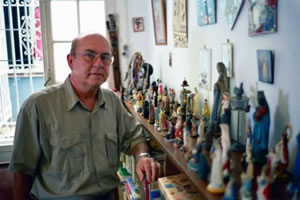
Miguel Barnet (Havanna, 28 januari 1940)
De Cubaanse dichter en schrijver José Martí werd geboren op 28 januari 1853 in Havanna. Zie ook mijn blog van 28 januari 2007 en ook mijn blog van 28 januari 2009 en ook mijn blog van 28 januari 2010.
I have a white rose to tend
I have a white rose to tend
In July as in January;
I give it to the true friend
Who offers his frank hand to me.
And for the cruel one whose blows
Break the heart by which I live,
Thistle nor thorn do I give:
For him, too, I have a white rose.
Because your eyes were two flames
Because your eyes were two flames
And your brooch wasn’t pinned right,
I thought you had spent the night
In playing forbidden games.
Because you were vile and devious
Such deadly hatred I bore you:
To see you was to abhor you
So lovely and yet so villainous.
Because a note came to light,
I know now where you had been,
And what you had done unseen —
Cried for me all the long night.
Vertaald door Manuel A. Tellechea
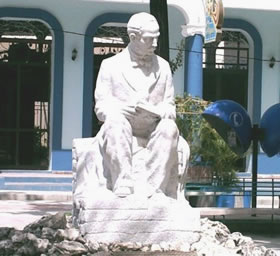
José Martí (28 januari 1853 – 19 mei 1895)
Standbeeld in het José Martí park, Guantanamo City
De Engelse schrijver en literatuurwetenschapper David Lodge werd geboren op 28 januari 1935 in Londen. Zie ook mijn blog van 28 januari 2007 en ook mijn blog van 28 januari 2008 en ook mijn blog van 28 januari 2009 en ook mijn blog van 28 januari 2010.
Uit: Author, Author
„In the 1880s, if he was in town on a Sunday and the weather was dry, Henry James would often walk from his rooms in Bolton Street, Piccadilly, or later from his more commodious quatrième in De Vere Gardens, South Kensington, up to the heights of Hampstead, to visit George Du Maurier.
Their acquaintance had begun at a time when Henry’s social and artistic horizons were rapidly expanding. His second novel The American had made an impression on both sides of the Atlantic in 1877, and the novella Daisy Miller was a palpable “hit” in 1879. The appearance of Washington Square and The Portrait of a Lady a couple of years later consolidated his claim to be the coming man of the literary novel in the English-speaking world. His elegant, cosmopolitan essays appeared in the most prestigious reviews. Hostesses competed for his presence at their dinners and soirees. His diary was always full. Only by fleeing occasionally to France or Italy could he escape the relentless pressure of London social life.
So, as he himself was aware, it was a cause of puzzlement and even jealousy on the part of some of his friends that he gave so much of his time to the Du Mauriers, who were neither rich, nor “smart” nor dazzlingly clever. Poor Emma was certainly none of those things, and aspired to be nothing more than a comely, caring wife and mother. Du Maurier himself was good for light repartee at a dinner table, or a musical evening at home, but he was not intellectual; indeed, he was something of a philistine in cultural matters, constantly sniping at the Aesthetes in his cartoons from the conservative ramparts of Punch. Henry knew all this, but didn’t care. He liked Du Maurier, he liked his family, and he liked spending Sundays with them.
Henry, who turned 40 in 1883, was 10 years younger than Du Maurier, but they might have been contemporaries as far as looks went, and in many ways Henry, with his bushy beard, balding pate and incipient paunch, appeared the older and more mature. Du Maurier always had a slightly boyish air about him, even when his hair began to turn grey, whereas Henry had cultivated a middle-aged persona as early in his life as he plausibly could.”
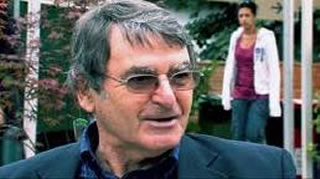
David Lodge (Londen, 28 januari 1935)
De Duitse dichter en schrijver Hermann Kesten werd geboren op 28 januari 1900 in Podwoloczyska (tegenwoordig Oekraïne). Zie ook mijn blog van 28 januari 2009 en ook mijn blog van 28 januari 2010.
Ich bin der ich bin
Ich stehe an der Barriere. Ich kann nur zurückblicken.
Oder den Propheten spielen.
Schließlich halte ich mich an der Gegenwart,
Einem Geländer, das abbricht.
Je länger ich mit mir umgehe, um so weniger kenne ich mich.
Gleich wird die Sonne untergehen.
Die Nacht beginnt, die nie mehr endet.
Es ist eine Finsternis, an die man sich nicht gewöhnt.
Das Haus, das einstürzt. Schnee, der schmilzt.
Eine Stimme, die aufhört.
Ich hatte hundert Freunde. Tausende kannte ich beim Namen.
Die Erde deckt sie.
Ich sollte zweimal leben. Hatte ich andere Absichten?
Verfehlte ich meine Träume?
Bin ich abgestürzt und merkte es nicht?
Jemand spricht öffentlich von meinem Alter.
Wer hieß ihn meine Jahre zählen?
Ich habe also weniger Haare und Zähne?
Ich bin der ich bin.
Einer der mit Schatten spielt.
Ein Erfinder von Figuren,
Erzähler absurder Geschichten aus deinem und meinem Leben.
Ich amüsiere mich über die komischen Repetitionen
Meinesgleichen.
Sie sehn wie Götter aus, die schon im Anfang aufhören.
In einer Welt, die ein Hiatus ist,
Ein Vexierrätsel, das keinen vexiert.
Ich gehe und blicke mich um.
Ruft er mich schon?
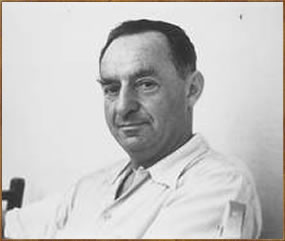
Hermann Kesten (28 januari 1900 – 3 mei 1996)
De Vlaamse dichter en schrijver Wies Moens werd geboren in Sint-Gillis-bij-Dendermonde op 28 januari 1898. Zie ook mijn blog van 28 januari 2009 en ook mijn blog van 28 januari 2010.
Laat mij mijn ziel dragen in het gedrang
Laat mij mijn ziel dragen in het gedrang!
Tusschen geringen staan en hun oogen richten
naarboven, waar blinken Uw eeuwige sterren.
Ik wil een snoeier zijn in de wijngaard,
een werkman bij de druivepersen.
Laat mij mijn ziel dragen in het gedrang!
Mijn woord in den mond van stamelaars,
mijn hand voor die liggen langs het pad.
En voor het raam van mijn woning
een vlam in den nacht:
dat wie verdolen mocht
richt zijn schreden
naar het Huis van Toevlucht.
Ik zal het waschbekken klaar zetten,
brood en wijn op de tafel –
en het boek geopend
aan de parabel van den Goeden Herder.
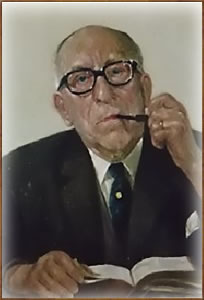
Wies Moens (28 januari 1898 – 5 februari 1982)
